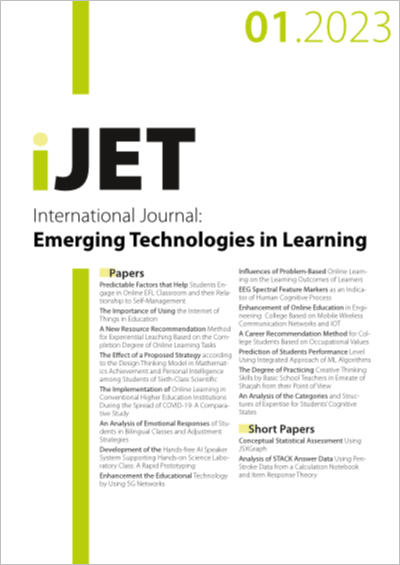Influences of Problem-Based Online Learning on the Learning Outcomes of Learners
DOI:
https://doi.org/10.3991/ijet.v18i01.36705Keywords:
Online teaching, Teaching mode, Learning outcome, Paired sample T-test, Independent sample T-testAbstract
Abstract—Influenced by the COVID-19 pandemic, online learning has become a major learning mode for most university students in China. For high-quality online teaching, teachers must optimize the teaching mode and strengthen the enthusiasm of students in classroom learning. In this study, a comparative experiment was carried out based on the course Cross-border E-commerce Customer Services for sophomore E-commerce majors at Huanghuai University in Zhumadian City, Henan Province, China. In the experiment, the teaching effect of the problem-based learning (PBL) mode in higher education was verified and gender differences in learning outcomes of learners who accepted PBL were analyzed. Results showed a significant difference at the 0.01 level between pre- and post-test results of the experimental group (t=−11.367, p=0.000), proving the teaching effect of PBL. The academic performances of the experimental class are significantly better compared with those of the control class, indicating that PBL is more beneficial to improve learning outcomes of students than traditional teaching methods. Gender has significant influences on post-test results at the 0.01 level (p=0.002<0.01). The median of final exam scores of male students is obviously higher than that of female students. Research conclusions can provide important references to test the effectiveness of PBL in learning outcomes of a specific subject, construct a PBL mode that can promote deep learning, and facilitate development of university teaching from knowledge teaching to core quality training of students.
Downloads
Published
How to Cite
Issue
Section
License
Copyright (c) 2022 Chi Zhang

This work is licensed under a Creative Commons Attribution 4.0 International License.



